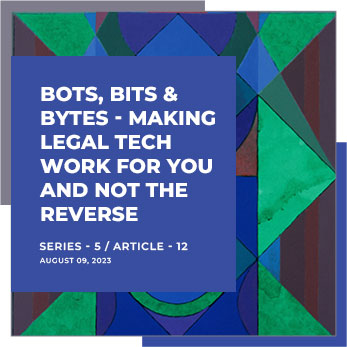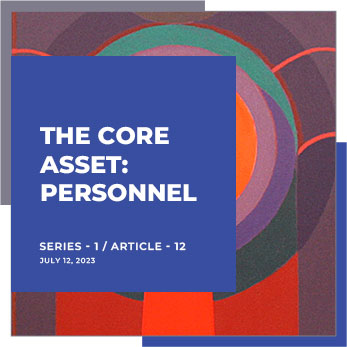“We use AI tools primarily for early case assessment to provide quick insights. When we start an investigation, we often need to cast our net wide and collect a lot of data. It is practically impossible to review all the data manually, since investigations regularly involve more than ten terabytes of data – that’s the equivalent of 80 sea containers filled with paperwork.”
The revolutionary technology of Artificial Intelligence (AI) is transforming industry and professions as it not only fundamentally changes—but also optimizes—the way in which processes are performed. Unlike previous revolutions, such as the industrial revolution, the AI revolution is not related so much to physical operation functions as it is to human thought. That’s the scary part, but at the same time, the promising part.
Not that human intellectual input should be replaced by machines—a notion considered radical by all but a handful of AI advocates—but rather helped to become, well, superhuman. We will examine the role that emerging AI technologies are playing in the business world in general and in the legal profession in particular.
The Great Disrupter
To state that AI is an industry and business ‘disrupter’ would be an understatement. While some experts claim that there is no real data on the extent to which AI has already displaced positions in the workforce, a McKinsey report has predicted that by 2030, 15% of all workers—or about 400 million people worldwide—will be displaced by AI. And, if the adoption of the technology is more widespread than the models indicate, that displacement figure could double.
Currently, AI is outperforming humans in terms of efficiency in such blue-collar manual roles as industrial robotics and even ‘serving’ as the waitstaff in a Florida restaurant; but it is the prospect of replacing a host of ‘thinkers’ in white-collar positions that is truly disruptive, and that’s where the impact on the legal profession could have much significance.
Legal Aid
The good news is that from eDiscovery to contract management and review, all the way to litigation outcome analyses and regulatory compliance, AI has thus far been employed more to aid lawyers than to replace them. The benefits to the legal profession are real, both by way of increasing attorney productivity and also by averting costly errors. At the time of the LIBOR transition, Machine Learning (ML) was utilized by law firms to review over 100 million mortgages and other loan documents totaling trillions of dollars in value—a feat that could not have been accomplished in a timely fashion by human analytical processing alone.
Integrated with eDiscovery and Research
The use of algorithms in foraging through documents produced for discovery as to relevance is not so recent; however, the next step of training ML to learn what to look for (‘smoking guns’) and what to reject—just as a human reviewer would do—is a process now utilized by most of the major eDiscovery providers. Electronically stored information (ESI) needed to support litigation must be gleaned from such electronic storage devices as laptops, desktops, corporate email systems, smartphones, archives and backup systems, as well as from social media accounts on platforms such as Facebook, Twitter, LinkedIn and others. Clearly, a superhuman rate of analysis and processing, as provided by ML, is required that goes well beyond what the attorney can do himself or herself.
Legal research is also moving from algorithm-driven keyword searches of vast databases using Boolean logic to actual semantic searches. Currently, under keyword-based search models, it is difficult for lawyers without domain knowledge of the law to obtain the needed information by searching with legal terms. However, in the proposed Semantic Legal Searcher (SLS), a neural information retrieval-based case law search model, the searcher is able to search and gain access to legal information even using simple queries rather than professional legal terms. As with other AI technologies—and especially ChatGPT—the SLS process starts with generating embeddings from a pre-trained language model, after which latent keywords are extracted by way of topic modeling, and then the relevance between input queries and legal documents is measured.
The Embedding Dilemma
Critics of AI point to the fact that what it has really learned is the data embedded by human trainers who themselves have biases in virtually all disciplines. And it is this embedded bias in the data references that renders AI’s analytical results questionable at best and, more likely, quite partial to the trainer’s outlook and partiality. There is also the issue of ‘explainability’: humans have the inability to understand the rationale behind AI-derived decisions, and this problem must be overcome before using AI technology for certain legal contexts.
Privacy Problems
Then there are the ethics and compliance concerns. On March 31, Italy’s data regulator issued an emergency decision barring OpenAI from using the (unauthorized) personal information of millions of Italians found to be included among the web scrapes collected as part of ChatGPT’s training data. The action was the first to be taken against ChatGPT by a European GDPR regulator, and it underscores the serious privacy policy violations alleged to be involved in creating the humongous generative AI models. According to Lilian Edwards, professor of law, innovation, and society at Newcastle University, “The Italians have called their bluff. It did seem pretty evident in the EU that this was a breach of data protection law.” Especially for lawyers, privacy policy non-compliance exposes them to not just regulatory but also ethics problems.
Despite the rather widespread adoption of AI in the areas of eDiscovery and legal research, there are still legitimate uncertainties as to whether AI—and its latest iteration, ChatGPT—can be relied upon to take the place of a lawyer’s analysis and input where intuition and experience beyond that provided by data training is required. In other words, for many responsibilities undertaken by law firms, they will still need to rely on that other AI: Attorney Intelligence.
Executive Summary
The Issue
What role will AI play in the overall business world and in the practice of law in particular?
The Gravamen
AI is being increasingly integrated into numerous business processes and in the practice of law with particular utility in the areas of eDiscovery and legal research.
The Path Forward
Despite the ability of ChatGPT to generate ‘human-like’ responses, the technology is not yet ready to take the place of human lawyers because developers have not yet found a way to overcome the inherent biases of data trainers.
Action Items
Superhuman Contract Review:
For firms practicing in the area of contract review, ML technology has been perfected to the point where firms can realistically rely on machines to outperform human processing, where millions of documents are concerned.
eDiscovery Sifting:
ML is considered an essential tool for the timely, efficient review of vast amounts of data to be produced in litigation and should be utilized for all substantial document review projects.
Legal Research:
Legal research methodology has moved on from legal keyword search algorithms to SLS being developed to allow simple queries, enabling law firms to employ non-lawyers for sophisticated, in-depth legal research.
Malpractice Insurance Concerns:
Various insurers have put firms on notice that the use of ChatGPT may expose them to ethical as well as cybersecurity risks. The practitioner would do well to check with their insurance carrier before integrating ChatGPT technology into their practice.
Further Readings
- https://www.linkedin.com/pulse/ai-law-positives-negatives-neil-sahota-%E8%90%A8%E5%86%A0%E5%86%9B-
- https://businesslawtoday.org/2022/02/how-ai-is-reshaping-legal-profession/
- https://www.v500.com/artificial-intelligence-transforming-law/
- https://www2.deloitte.com/ch/en/pages/forensics/articles/AI-and-machine-learning-in-E-discovery.html
- https://www.lawyer-monthly.com/2019/12/what-are-the-applications-of-ai-in-legal-compliance-practices/







